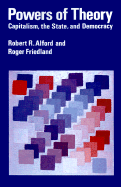Book contents
- Frontmatter
- Contents
- Preface
- Acknowledgments
- Introduction: State and society in theoretical perspective
- 1 Theoretical perspectives as modes of inquiry
- PART I THE PLURALIST PERSPECTIVE
- 2 State and society in pluralist perspective
- 3 The democratic state and consensus
- 4 The democratic state and participation
- 5 The pluralist perspective on the bureaucratic state
- 6 The pluralist perspective on the capitalist state
- PART II THE MANAGERIAL PERSPECTIVE
- PART III THE CLASS PERSPECTIVE
- PART IV THEORY, POLITICS, AND CONTRADICTIONS IN THE STATE
- Glossary
- Bibliography
- Name index
- Subject index
3 - The democratic state and consensus
Published online by Cambridge University Press: 01 June 2011
- Frontmatter
- Contents
- Preface
- Acknowledgments
- Introduction: State and society in theoretical perspective
- 1 Theoretical perspectives as modes of inquiry
- PART I THE PLURALIST PERSPECTIVE
- 2 State and society in pluralist perspective
- 3 The democratic state and consensus
- 4 The democratic state and participation
- 5 The pluralist perspective on the bureaucratic state
- 6 The pluralist perspective on the capitalist state
- PART II THE MANAGERIAL PERSPECTIVE
- PART III THE CLASS PERSPECTIVE
- PART IV THEORY, POLITICS, AND CONTRADICTIONS IN THE STATE
- Glossary
- Bibliography
- Name index
- Subject index
Summary
In the pluralist perspective, the democratic aspect of the state is primary. Healthy democracy can prevent pathological tendencies toward bureaucratic rigidity and class conflict. Stable democratic institutions depend on a consensual political culture. The content of this political culture – the values and beliefs of citizens and leaders – is based on nonpolitical processes in the economy, family, community, and religion. These values come to be reflected in the political and governmental institutions of the society. In this chapter we examine the pluralist view of the role of political culture and consensus in maintaining democratic stability.
Democracy
Pluralists tend to view democracy as a set of procedures and processes. Robert A. Dahl defines democracy as a system in which all citizens have free opportunity to (1) formulate their preferences, (2) signify their preferences to other citizens and to the government through both individual and collective action, and (3) have their preferences weighted equally in the conduct of the government (1971, p. 2). Dahl qualifies his definition by asserting that no existing society meets all of those conditions. The definition thus is an abstract concept of democracy as a property of any “political system,” to which any existing society could be compared. This analytic procedure isolates the democratic aspect of the state from the other aspects of the state so that it becomes a variable that then can be correlated with other variable properties of the society while the other aspects are held constant.
- Type
- Chapter
- Information
- Powers of TheoryCapitalism, the State, and Democracy, pp. 59 - 82Publisher: Cambridge University PressPrint publication year: 1985

